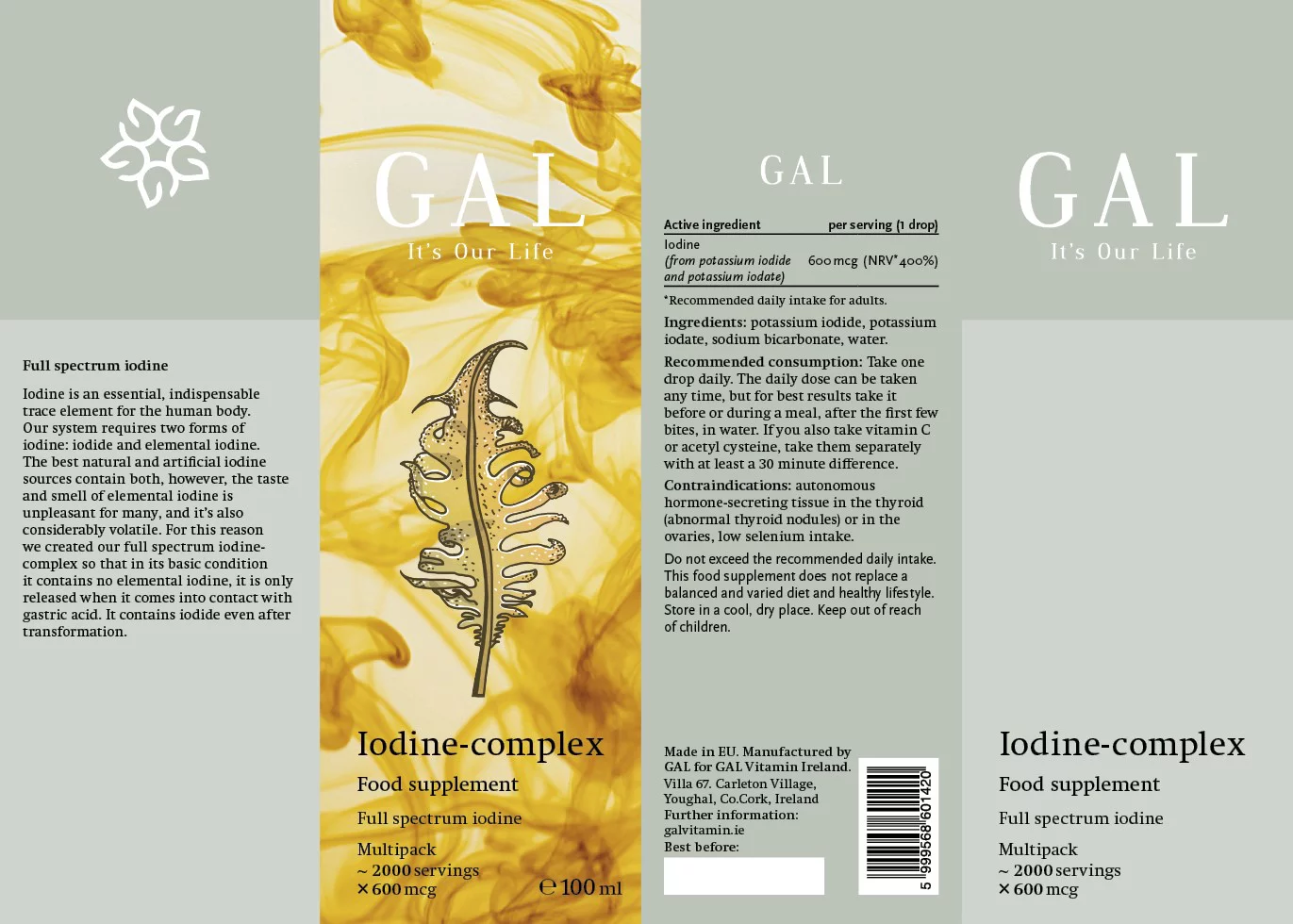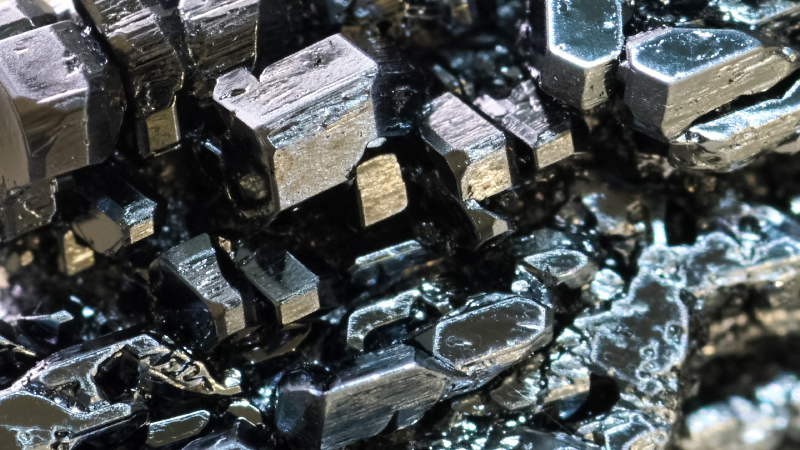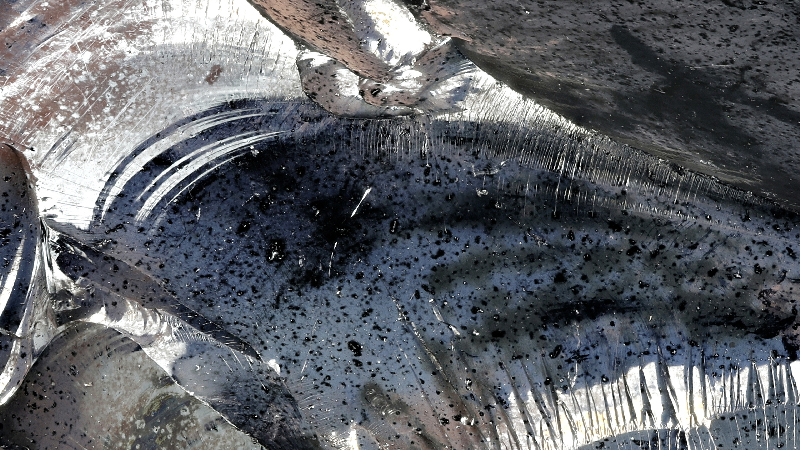
Contraindications
Iodine supplementation is inadvisable if autonomous hormone-secreting tissue in the thyroid is either in the form of a toxic nodule or scattered microscopic formulae. This irregularity becomes independently functioning tissue which doesn’t respond to the signal of the pituitary gland and produces as many hormones (TSH) as possible from the base material it can obtain so iodine supplementation can lead to hyperthyroidism, hyperactivity of the thyroid.
Further contraindications: struma ovaries (T4 hormone producing teratoma in the ovary), severe kidney disorders and Duhring’s disease. Iodine allergy per se is not a contraindication because it doesn’t exist: humans can’t be allergic to inorganic iodine, an essential element. Reactions to organic iodine forms (CT contrast agents, medicine containing iodine) don’t mean that one shouldn’t take inorganic iodine.
If iodine intake is low (the Carpathian basin is a definitely iodine-deficient region), the body, being an intelligent system endeavours to distribute the little iodine it can obtain in order of importance. As a result, competition emerges between the organs and tissues that need iodine and the ones at the end of the line won’t get the optimal amount which forces them to run compensatory mechanisms to a greater extent. However, this has long-term consequences: tissue structure can be deformed and dysfunction may set in.
Symptoms of iodine deficiency
Apart from certain thyroid problems (hypothyroidism, lumps, goitre) warning signs can be lumps and cysts in the breasts, ovarian cysts, uterine fibroids, histological deformations of the endometrium/cervical orifice, and prostate problems for men. In the case of childhood developmental abnormalities of the nervous system (iodine supplementation during pregnancy has a very positive effect on IQ), disorders of the immune system, digestive problems, brain fog, memory and concentration problems, and irregular functioning of the nervous system.
Naturally, iodine deficiency is not the only factor that leads to these conditions, however, it is one whose significance has neither been recognized nor emphasized enough until now.
Not only thyroid disorders can point to iodine deficiency. On the contrary, since the hormones produced by the thyroid play an extremely important role in physiological function if iodine intake is low, the thyroid takes priority. This also means that even if thyroid functions are satisfactory there can easily be iodine deficiency in the above-mentioned parts of the body. Playing it safe means consuming much more iodine than the minimal needs of the thyroid (100-200 µg daily). This way it can make a positive impact on every part of the body.
Iodine’s cofactors
in order to achieve that we need further minerals, trace elements and vitamins which work in synergy with iodine. These so-called iodine cofactors are the following:
- selenium
- magnesium
- vitamin C
- zink, copper, iron
- unrefined salt
- fat-soluble vitamins
- vitamins B
- essential fatty acids (mainly omega-3)
Adequate selenium supplies are especially important because this trace element is a critical component of the glutathione peroxidase (GPx) antioxidant enzyme. Among other organs, it’s also present in the thyroid and controls oxidative processes indispensable for hormone production. In a selenium deficient state, it can be harmful to supplement iodine (it can cause inflammation of the thyroid) because GPx enzyme activity is inadequate in these cases. Selenium also plays a vital role in the conversion of thyroid hormones (T4-T3 conversion) as the deiodinase enzymes responsible for this contain selenium.
Vitamin C supports the proper functioning of the Sodium/Iodide symporters (NIS) that bring iodine to the cells. Toxic halogen materials – e.g. fluor, bromine, chlorine and their derivatives – present in our modern environment severely damage these bio-cellular “iodine pumps” which further increases iodine deficiency. Vitamin C helps repair this damage. Consuming unrefined salt also supports this. It’s best to take vitamin C about an hour later than the GAL Iodine complex so that elemental iodine can be absorbed.
Iodine isn’t correctly utilised alongside iron deficiency because many enzymes involved in metabolic processes connected to iodine are so-called haem-peroxidase-containing iron. Before introducing a larger iodine dosage it is strongly advised to sort out the body’s iron supply, primarily through diet, eating liver and other offals regularly. Lactoferrin can also support this process.
In view of the above, we recommend taking GAL Multivitamin, GAL+Multivitamin or our Prenatal products, in some cases further complementing it with magnesium and vitamin C.
Dosage
The current recommended daily intake (100-200 µg), has been defined based on the bare minimum, the so-called “goitre standard”. This means that if the condition doesn’t occur iodine supplies are ideal. Nothing could be further from the truth.
We have already experienced in the case of vitamin D that the formerly recommended daily intake (200 IU) increased ten-twentyfold in the past 10-15 years since such functions of vitamin D came to light which points beyond its most fundamental role in the bone structure. For these extra effects to manifest, however, a higher vitamin D level is necessary. This is why in 2012 as a result of common consent among Hungarian physicians daily recommended intake was raised to 2-3000 IU and capped at 4000 IU. This is still a rather conservative value but it’s a multiple of the former wrong amount.
A similar change started in the early 2000s with regard to iodine following the groundbreaking work of an American team of doctors. It turned out that although it is possible that with remarkably low intake the thyroid gets enough iodine, it’s not the only organ that needs it. If we count the organs that would use iodine if there were a larger supply we would get to the two-digit milligram domain. Iodine supplementation to this degree, however, has a special protocol and in the name of responsible behaviour, tests must precede it. You can find further information in the FB group on Science-based iodine supplementation.
So iodine, as an essential trace element has numerous bonus functions besides its role in the synthesis of thyroid hormones but in order for them to be realized increased intake is necessary. Unfortunately, the mills grind slowly, it takes time for official recommendations to change.
But can iodine overdose? Well, don’t be afraid: healthy kidneys very efficiently secrete inorganic iodine from blood plasma – similarly to the other small, water-soluble ions so this way the part not used by cells is simply discharged with urine.
Resolving some misunderstandings concerning iodine
Higher iodine intake has been criticized on several occasions. One criticism is that it blocks the thyroid’s iodine absorption and hormone synthesis (Wolff-Chaikoff effect). This is not true and it’s based on a wrong conclusion drawn from a poorly planned 1948 animal experiment where radioactive iodine was used to examine how much iodine a rat’s thyroid takes when iodine intake was increased (stable isotope). In fact, the higher serum iodide level, result of increased iodine intake only blocked the radioactive iodine from getting into the thyroid following the principle of competitive inhibition and not stable iodine (I-127). It also didn’t cause any functional disorders in the thyroid and still, the misunderstanding has spread. It was aided by the fact that in the case of increased iodine intake TSH tends to temporarily rise so this is how the body urges the thyroid’s iodine filling symporters (NIS) to build up and regenerate. This phenomenon in itself, however, doesn’t point to hypothyroidism.
It could also be heard that you shouldn’t take complex iodine products that supply the body with both iodide and elemental iodine because the latter is toxic and humans hadn’t previously obtained iodine in this form so the body is not prepared for it and it makes no sense to take elemental iodine in the first place because it is completely reduced to iodide in the gastrointestinal tract. Well, none of that is true, beside iodide we do need elemental (molecular) iodine, and both inorganic forms can be found in seaweed – in varying proportions and amounts. Elemental iodine primarily helps control cell differentiation, and the healthy cell cycle (supporting apoptosis) as well as maintaining healthy tissue architecture.
Finally, a few words on whether higher iodine intake increases the risk of autoimmune thyroid diseases. In fact, this is only an actual risk if the selenium supplies of the body are insufficient. The preliminary adjustment of the cofactor levels eliminates this risk. It only goes to show that iodine supplementation requires awareness, it’s worth becoming familiar with the principles of the topic and then reintroducing this previously unfairly neglected trace element into our lives.
Warnings
KEEP OUT OF REACH OF CHILDREN. DO NOT EXCEED RECOMMENDED DOSE.
If you are undergoing treatment for a medical condition or if you are pregnant or lactating, please consult your medical practitioner before introducing supplementary foods to your normal routine. The dietary supplement should not be used as a substitute for a varied and balanced diet or a healthy lifestyle. Store tightly closed in a cool and dry place.
References:
1. Dr. David Brownstein: Iodine: Why You Need It, why You Can't Live Without it, 5. kiadás (2014)
2. Lynne Farrow: A gyógyító jód - Nem csak pajzsmirigybetegeknek! Partvonal kiadó (2017)
3. oceansofgoodness.co.uk: Seaweed Health Foundation: Iodine Fact Sheet
17. Dr. Guy E. Abraham - A Wolff-Chaikoff hatás - Farkast kiáltottak?
19. Dr. Guy E. Abraham és munkatársainak publikációs anyagai összefűzve (PDF)

-Allergen-free
- Glutenfree
- Egg-free
- Soy allergen-free
- Dairy and lactose-free
- Free of sulfur dioxide
- Sugar-free
- GMO-free
- Vegetarian
- Vegan
- FSC paper material (CO31340)
- Packaging from carbon-neutral production
- 100% recyclable packaging
Green: The product has the described property
Red: The product does not have the described property

Brief and precise summary of Iodine
Iodine is an essential mineral that is required for the proper functioning of the thyroid gland, brain, and nervous system development, as well as immunity and for maintaining the health of the female reproductive organs (breasts, ovaries, endometrium, cervix) and the prostate.
Brief and precise summary of Selenium


